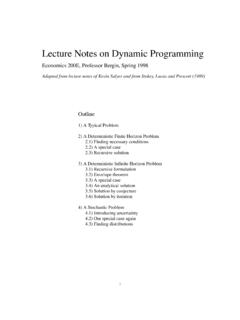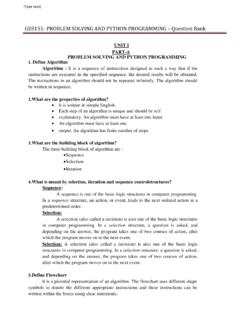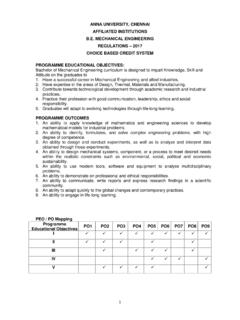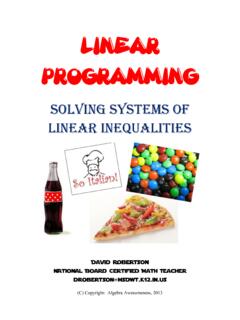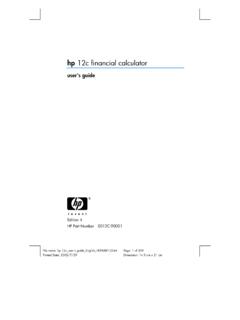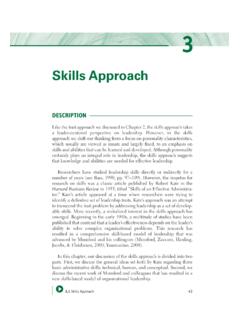Transcription of Learning Algorithms Through Programming and Puzzle …
1 Learning ALGORITHMSTHROUGHPROGRAMMING AND Puzzle SOLVINGIOLAGRHTMSby Alexander Kulikov and Pavel PevznerWelcome!Thank you for joining us! This book powers our popular Data Structuresand Algorithms online specialization on Coursera1and online MicroMas-ters program at edX2. We encourage you to sign up for a session and learnthis material while interacting with thousands of other talented studentsfrom around the world. As you explore this book, you will find a numberof active Learning components that help you study the material at yourown CHALLENGESask you to implement the algo-rithms that you will encounter in one of Programming languagesthat we support:C,C++,Java,JavaScript,Python,Sca la,C#,Haskell,Ruby, andRust(the last four Programming languages aresupported by Coursera only).
2 These code challenges are embeddedin our Coursera and edX online PUZZLES provide you with a fun way to invent the key algorithmic ideas on your own! Even if you fail to solve somepuzzles, the time will not be lost as you will better appreciate thebeauty and power of Algorithms . These puzzles are also embeddedin our Coursera and edX online BREAKS offer just in time assessments testing yourunderstanding of a topic before moving to the next and THINK questions invite you to slow down and contem-plate the current material before continuing to the next Algorithms Through Programmingand Puzzle SolvingAlexander S.
3 Kulikov and Pavel PevznerActive Learning Technologies 2018 Copyright 2018 by Alexander S. Kulikov and Pavel Pevzner. All book or any portion thereof may not be reproduced or used in anymanner whatsoever without the express written permission of the pub-lisher except for the use of brief quotations in a book : 978-0-9996762-0-2 Active Learning TechnologiesAddress:3520 Lebon DriveSuite 5208 San Diego, CA 92122, USATo my parents. my family. This BookixProgramming Challenges and Algorithmic PuzzlesxiiWhat Lies AheadxvMeet the AuthorsxviMeet Our Online Co-InstructorsxviiAcknowledgmentsxviii1 Algorithms and What Is an Algorithm?
4 Pseudocode .. Problem Versus Problem Instance .. Correct Versus Incorrect Algorithms .. Fast Versus Slow Algorithms .. Big-O Notation ..62 Algorithm Design Exhaustive Search Algorithms .. Branch-and-Bound Algorithms .. Greedy Algorithms .. Dynamic Programming Algorithms .. Recursive Algorithms .. Divide-and-Conquer Algorithms .. Randomized Algorithms ..203 Programming Sum of Two Digits .. Maximum Pairwise Product.
5 Algorithm .. Algorithm .. and Debugging .. You Tell Me What Error Have I Made? .. Testing .. Faster Algorithm .. More Compact Algorithm .. solving a Programming Challenge in Five Easy Steps .. Problem Statement .. an Algorithm .. an Algorithm .. and Debugging .. to the Grading System .. Good Programming Practices ..454 Algorithmic Warm Fibonacci Number .. Last Digit of Fibonacci Number .. Greatest Common Divisor .. Least Common Multiple.
6 Fibonacci Number Again .. Last Digit of the Sum of Fibonacci Numbers .. Last Digit of the Sum of Fibonacci Numbers Again ..635 Greedy Money Change .. Maximum Value of the Loot .. Maximum Advertisement Revenue .. Collecting Signatures .. Maximum Number of Prizes .. Maximum Salary ..776 Binary Search .. Majority Element .. ImprovingQuickSort.. Number of Inversions .. Organizing a Lottery .. Closest Points ..92 Contentsvii7 Dynamic Money Change Again.
7 Primitive Calculator .. Edit Distance .. Longest Common Subsequence of Two Sequences .. Longest Common Subsequence of Three Sequences .. Maximum Amount of Gold .. Partitioning Souvenirs .. Maximum Value of an Arithmetic Expression .. 111 Appendix113 Compiler Flags .. 113 Frequently Asked Questions .. 114viiiContentsAbout This BookI find that I don t understand things unless I try to program them. Donald E. Knuth,The Art of Computer Programming , Volume 4 There are many excellent books on Algorithms why in the world wewould write another one?
8 ??Because we feel that while these books excel in introducing algorith-mic ideas, they have not yet succeeded in teaching you how to implementalgorithms, the crucial computer science goal is to develop anIntelligent Tutoring Systemfor Learning algo-rithms Through Programming that can compete with the best professors ina traditional classroom. ThisMOOC bookis the first step towards this goalwritten specifically for our Massive Open Online Courses (MOOCs) form-ing a specialization Algorithms and Data Structures on Coursera plat-form3and a microMasters program on edX platform4.
9 Since the launchof our MOOCs in 2016, hundreds of thousand students enrolled in thisspecialization and tried to solve more than hundred algorithmic program- ming challenges to pass it. And some of them even got offers from smallcompanies like Google after completing our specialization!In the last few years, some professors expressed concerns about thepedagogical quality of MOOCs and even called them the junk food of ed-ucation. In contrast, we are among the growing group of professors whobelieve that traditional classes, that pack hundreds of students in a singleclassroom, represent junk food of education.
10 In a large classroom, oncea student takes a wrong turn, there are limited opportunities to ask a ques-tion, resulting in alearning breakdown, or the inability to progress furtherwithout individual guidance. Furthermore, the majority of time a studentinvests in an Algorithms course is spent completing assignments outsidethe classroom. That is why we stopped giving lectures in our offline classes(and we haven t got fired yet :-). Instead, we giveflipped classeswhere stu-dents watch our recorded lectures, solve algorithmic puzzles, completeprogramming challenges using our automated homework checking sys-tem before the class, and come to class prepared to discuss their This Bookbreakdowns with a student suffers a Learning breakdown, that student needs im-mediate help in order to proceed.

